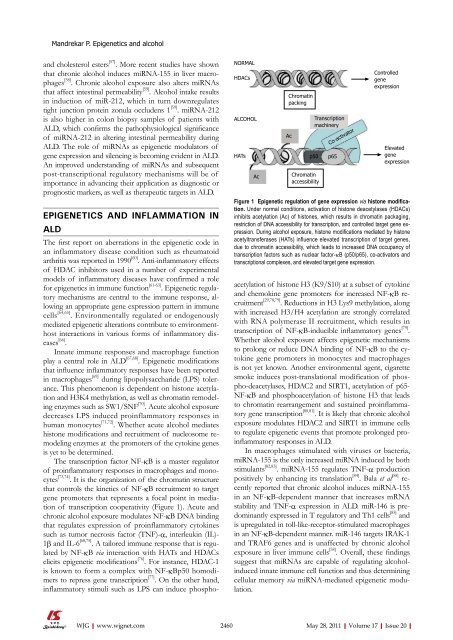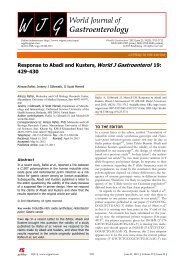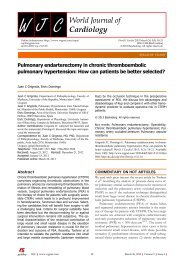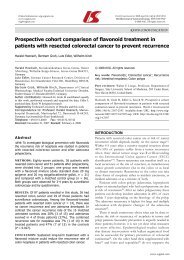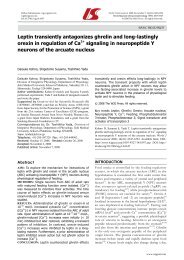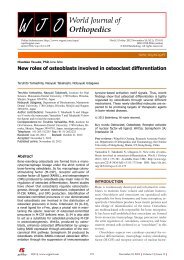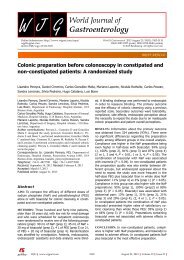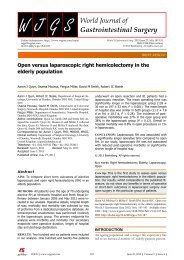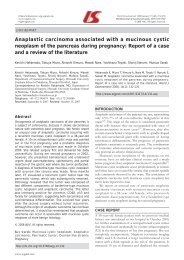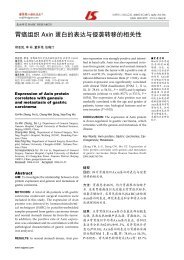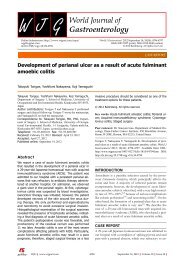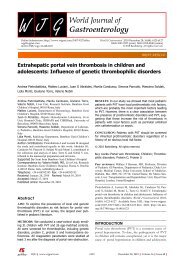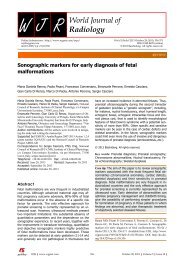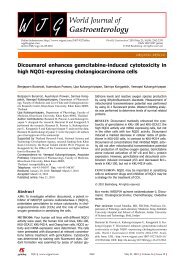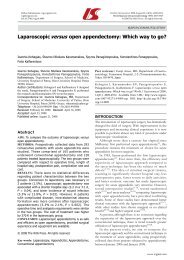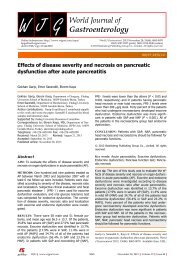20 - World Journal of Gastroenterology
20 - World Journal of Gastroenterology
20 - World Journal of Gastroenterology
Create successful ePaper yourself
Turn your PDF publications into a flip-book with our unique Google optimized e-Paper software.
Mandrekar P. Epigenetics and alcohol<br />
and cholesterol esters [57] . More recent studies have shown<br />
that chronic alcohol induces miRNA-155 in liver macrophages<br />
[58] . Chronic alcohol exposure also alters miRNAs<br />
that affect intestinal permeability [59] . Alcohol intake results<br />
in induction <strong>of</strong> miR-212, which in turn downregulates<br />
tight junction protein zonula occludens 1 [59] . miRNA-212<br />
is also higher in colon biopsy samples <strong>of</strong> patients with<br />
ALD, which confirms the pathophysiological significance<br />
<strong>of</strong> miRNA-212 in altering intestinal permeability during<br />
ALD. The role <strong>of</strong> miRNAs as epigenetic modulators <strong>of</strong><br />
gene expression and silencing is becoming evident in ALD.<br />
An improved understanding <strong>of</strong> miRNAs and subsequent<br />
post-transcriptional regulatory mechanisms will be <strong>of</strong><br />
importance in advancing their application as diagnostic or<br />
prognostic markers, as well as therapeutic targets in ALD.<br />
EPIGENETICS AND INFLAMMATION IN<br />
ALD<br />
The first report on aberrations in the epigenetic code in<br />
an inflammatory disease condition such as rheumatoid<br />
arthritis was reported in 1990 [60] . Anti-inflammatory effects<br />
<strong>of</strong> HDAC inhibitors used in a number <strong>of</strong> experimental<br />
models <strong>of</strong> inflammatory diseases have confirmed a role<br />
for epigenetics in immune function [61-63] . Epigenetic regulatory<br />
mechanisms are central to the immune response, allowing<br />
an appropriate gene expression pattern in immune<br />
cells [64,65] . Environmentally regulated or endogenously<br />
mediated epigenetic alterations contribute to environmenthost<br />
interactions in various forms <strong>of</strong> inflammatory diseases<br />
[66] .<br />
Innate immune responses and macrophage function<br />
play a central role in ALD [67,68] . Epigenetic modifications<br />
that influence inflammatory responses have been reported<br />
in macrophages [69] during lipopolysaccharide (LPS) tolerance.<br />
This phenomenon is dependent on histone acetylation<br />
and H3K4 methylation, as well as chromatin remodeling<br />
enzymes such as SW1/SNF [70] . Acute alcohol exposure<br />
decreases LPS induced proinflammatory responses in<br />
human monocytes [71,72] . Whether acute alcohol mediates<br />
histone modifications and recruitment <strong>of</strong> nucleosome remodeling<br />
enzymes at the promoters <strong>of</strong> the cytokine genes<br />
is yet to be determined.<br />
The transcription factor NF-κB is a master regulator<br />
<strong>of</strong> proinflammatory responses in macrophages and monocytes<br />
[73,74] . It is the organization <strong>of</strong> the chromatin structure<br />
that controls the kinetics <strong>of</strong> NF-κB recruitment to target<br />
gene promoters that represents a focal point in mediation<br />
<strong>of</strong> transcription cooperativity (Figure 1). Acute and<br />
chronic alcohol exposure modulates NF-κB DNA binding<br />
that regulates expression <strong>of</strong> proinflammatory cytokines<br />
such as tumor necrosis factor (TNF)-α, interleukin (IL)-<br />
1β and IL-6 [68,75] . A tailored immune response that is regulated<br />
by NF-κB via interaction with HATs and HDACs<br />
elicits epigenetic modifications [76] . For instance, HDAC-1<br />
is known to form a complex with NF-κBp50 homodimers<br />
to repress gene transcription [77] . On the other hand,<br />
inflammatory stimuli such as LPS can induce phospho-<br />
WJG|www.wjgnet.com<br />
NORMAL<br />
HDACs<br />
ALCOHOL<br />
HATs<br />
Ac<br />
Chromatin<br />
packing<br />
Ac<br />
Chromatin<br />
accessibility<br />
Transcription<br />
machinery<br />
p50 p65<br />
Co-activator<br />
Controlled<br />
gene<br />
expression<br />
Elevated<br />
gene<br />
expression<br />
Figure 1 Epigenetic regulation <strong>of</strong> gene expression via histone modification.<br />
Under normal conditions, activation <strong>of</strong> histone deacetylases (HDACs)<br />
inhibits acetylation (Ac) <strong>of</strong> histones, which results in chromatin packaging,<br />
restriction <strong>of</strong> DNA accessibility for transcription, and controlled target gene expression.<br />
During alcohol exposure, histone modifications mediated by histone<br />
acetyltransferases (HATs) influence elevated transcription <strong>of</strong> target genes,<br />
due to chromatin accessibility, which leads to increased DNA occupancy <strong>of</strong><br />
transcription factors such as nuclear factor-κB (p50/p65), co-activators and<br />
transcriptional complexes, and elevated target gene expression.<br />
acetylation <strong>of</strong> histone H3 (K9/S10) at a subset <strong>of</strong> cytokine<br />
and chemokine gene promoters for increased NF-κB recruitment<br />
[29,78,79] . Reductions in H3 Lys9 methylation, along<br />
with increased H3/H4 acetylation are strongly correlated<br />
with RNA polymerase II recruitment, which results in<br />
transcription <strong>of</strong> NF-κB-inducible inflammatory genes [79] .<br />
Whether alcohol exposure affects epigenetic mechanisms<br />
to prolong or reduce DNA binding <strong>of</strong> NF-κB to the cytokine<br />
gene promoters in monocytes and macrophages<br />
is not yet known. Another environmental agent, cigarette<br />
smoke induces post-translational modification <strong>of</strong> phospho-deacetylases,<br />
HDAC2 and SIRT1, acetylation <strong>of</strong> p65-<br />
NF-κB and phosphoacetylation <strong>of</strong> histone H3 that leads<br />
to chromatin rearrangement and sustained proinflammatory<br />
gene transcription [80,81] . It is likely that chronic alcohol<br />
exposure modulates HDAC2 and SIRT1 in immune cells<br />
to regulate epigenetic events that promote prolonged proinflammatory<br />
responses in ALD.<br />
In macrophages stimulated with viruses or bacteria,<br />
miRNA-155 is the only increased miRNA induced by both<br />
stimulants [82,83] . miRNA-155 regulates TNF-α production<br />
positively by enhancing its translation [84] . Bala et al [58] recently<br />
reported that chronic alcohol induces miRNA-155<br />
in an NF-κB-dependent manner that increases mRNA<br />
stability and TNF-α expression in ALD. miR-146 is predominantly<br />
expressed in T regulatory and Th1 cells [85] and<br />
is upregulated in toll-like-receptor-stimulated macrophages<br />
in an NF-κB-dependent manner. miR-146 targets IRAK-1<br />
and TRAF6 genes and is unaffected by chronic alcohol<br />
exposure in liver immune cells [58] . Overall, these findings<br />
suggest that miRNAs are capable <strong>of</strong> regulating alcoholinduced<br />
innate immune cell function and thus determining<br />
cellular memory via miRNA-mediated epigenetic modulation.<br />
2460 May 28, <strong>20</strong>11|Volume 17|Issue <strong>20</strong>|


